16 july 2019

Leah Goldin, mother of Hadar Goldin whose remains have been held by Hamas since Operation Protective Edge, confronts the prime minister and accuses him of trying to silence the families of MIAs and POWs days before the 5-year anniversary of the 2014 war
The mother of a fallen IDF soldier whose remains are held by Hamas in Gaza was left sobbing after a meeting with the prime minister, which she left just half an hour after it began.
Leah Goldin’s son Hadar died alongside five other IDF soldiers during Operation Protective Edge on July 20, 2014, and his body is believed to be held by the terror group in the enclave to this day. Israel this week officially marks five years since the seven-week-long war broke out.
"The whole purpose of the meeting was to silence the families shortly before the anniversary of Operation Protective Edge,” Goldin said after the meeting, which was held Tuesday evening between Prime Minister Benjamin Netanyahu and the families of Israelis held captive in the Strip.
The family of another soldier who was killed alongside Goldin - Oron Shaul - was also at the meeting. The relatives of Avera Mengistu and Hisham al-Sayed - two mentally ill Israeli citizens captured by Hamas after voluntarily crossing into Gaza - were among the attendees as well.
At the onset of the meeting the prime minister apparently offered to fly the families to New York City in order to allow them to participate at a ceremonial event at the main U.N. Headquarters, raising awareness about Israeli MIAs and POWs.
The offer prompted Goldin to confront Netanyahu as to why nothing has been done by his government until this point. "I wonder why all of a sudden you remembered who we are, after five years during which you did nothing,” she said during the meeting. “We don’t need a trip to New York, we’ve already done all of this successfully ourselves."
The Goldin family issued a statement after the event, suggesting Netanyahu’s offer was made as part of his attempt to silence the bereaved families during a time when the country is marking Protective Edge’s anniversary.
“We feel as though the prime minister was doing all he could to make it through the next two weeks, during which we will mark five years since the abduction of our son Hadar,” said the family. “Even after this meeting, it’s still unclear to us why Netanyahu is not making the return of our sons a condition for any rehabilitation of Gaza.”
"Prime Minister Netanyahu understands the pain of the families and will continue to do everything in his power to bring their sons home," said The Prime Minister's Office in response.
The mother of a fallen IDF soldier whose remains are held by Hamas in Gaza was left sobbing after a meeting with the prime minister, which she left just half an hour after it began.
Leah Goldin’s son Hadar died alongside five other IDF soldiers during Operation Protective Edge on July 20, 2014, and his body is believed to be held by the terror group in the enclave to this day. Israel this week officially marks five years since the seven-week-long war broke out.
"The whole purpose of the meeting was to silence the families shortly before the anniversary of Operation Protective Edge,” Goldin said after the meeting, which was held Tuesday evening between Prime Minister Benjamin Netanyahu and the families of Israelis held captive in the Strip.
The family of another soldier who was killed alongside Goldin - Oron Shaul - was also at the meeting. The relatives of Avera Mengistu and Hisham al-Sayed - two mentally ill Israeli citizens captured by Hamas after voluntarily crossing into Gaza - were among the attendees as well.
At the onset of the meeting the prime minister apparently offered to fly the families to New York City in order to allow them to participate at a ceremonial event at the main U.N. Headquarters, raising awareness about Israeli MIAs and POWs.
The offer prompted Goldin to confront Netanyahu as to why nothing has been done by his government until this point. "I wonder why all of a sudden you remembered who we are, after five years during which you did nothing,” she said during the meeting. “We don’t need a trip to New York, we’ve already done all of this successfully ourselves."
The Goldin family issued a statement after the event, suggesting Netanyahu’s offer was made as part of his attempt to silence the bereaved families during a time when the country is marking Protective Edge’s anniversary.
“We feel as though the prime minister was doing all he could to make it through the next two weeks, during which we will mark five years since the abduction of our son Hadar,” said the family. “Even after this meeting, it’s still unclear to us why Netanyahu is not making the return of our sons a condition for any rehabilitation of Gaza.”
"Prime Minister Netanyahu understands the pain of the families and will continue to do everything in his power to bring their sons home," said The Prime Minister's Office in response.
9 july 2019
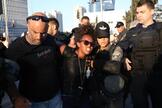
Palestinians these days are fond of circulating on social media a scene from an old Israeli comedy which shows a group of Hamas fighters who could sneak through a tunnel into enemy territory and kidnap an Israeli officer in order to exchange him for Palestinian prisoners.
Although things go smoothly, the whole operation is a flop. Why? Because it was dark and they could not see that the officer was dark-skinned. When the group leader realises that the prisoner is of Ethiopian origin, he knows that all their efforts are for nothing.
Then the group enters into a long discussion on how to convince the Israelis to exchange him for fewer Palestinian prisoners, but end up convinced that the Israelis will give them nothing in return for him, and even he will not believe that the Israeli army and government care for him. They only have one problem; what to do with this good-for-nothing prisoner, without hurting his feelings. They finally decide to release him.
The officer does not believe that even Hamas does not want him and tries to convince his captors that even though he is a dark-skinned Israeli, he is valuable because he is not a mere soldier, he is an officer, and an important one. They are not convinced. One of the group tells him that he should thank God he is not a Druze. He asks them for a lift but they refuse to drop him to the separation line, and ask him to run, for Israeli soldiers are good at running.
Such comedy is not uncommon in this decades-long conflict. People on both sides like to produce and watch it, maybe because people tend to be more honest with themselves when they are laughing. Although such video clips are meant for self-criticism, they are in many cases used as propaganda to ridicule the enemy and boost one’s own self-confidence.
Last week, an Israeli police officer shot and killed 18-year-old Solomon Teka, a young Ethiopian Jew, triggering widespread protests which blocked public transport in major cities such as Tel Aviv and Jerusalem, reminding people of the Arab Spring. Foreign media showed some Ethiopians declaring their support for Palestine and changing their religion to Islam, in a rebellion against the state of Israel, which they describe as rotten to the core. They are, in almost every respect, treated as third class citizens by the state.
In a move to utilise the Ethiopian-Israeli protests, a Palestinian comedian from Gaza called Ali Nasman wrote a comic song, making fun of Israel’s racism towards its dark-skinned citizens. For the video of him singing it, he blackened his face and was joined by of a group of dark-skinned young Palestinians to mock the way that Ethiopian Jews are treated in Israel. He is seen with a little boy taking a bus, and a white policeman forces them off, calling them “black scum”. Nasman then reminds us how Israel neglected an Ethiopian-Israeli soldier captured by Hamas.
To fan the flames, the Hamas military wing revealed that Israel has never demanded to discuss the case of the missing soldier, Avraham Mengistu, when the issue of enemy prisoners is mentioned. It has been like this ever since his disappearance; he has been omitted from the negotiations file completely.” Mengistu’s family accuses the Israeli government of double standards based on racial discrimination.
Now the head of the committee appointed by the Israeli Ministry of Justice to investigate Teka’s killing, Keren Bar-Menachem, has told the young man’s family that, “The ballistic report shows that the off-duty policeman who shot Teka shot toward the ground, and the bullet ricocheted and hit the 18-year-old’s chest.”
This time, the dead man is an Israeli Jew, not a Palestinian, so things are supposed to be different. Sweeping official racism under the carpet will not be possible. Next time that Netanyahu wants to boast in front of his AIPAC benefactors in the US about making a homogeneous society out of diverse colonial communities he will have to think long and hard if he is to be honest. Institutionalised racism against Ethiopian Jews marks the failure of the whole Zionist colonialist project, because racial discrimination is inherent in the whole ideology underpinning the colonial-settler state; just ask the Palestinians, for they know that this is all too true.
As Israeli-American activist Miko Peled has said, “Supporting Zionism and Israel is supporting racism and violence. Supporting the Palestinian struggle is supporting efforts to replace racism and violence with justice, freedom and equal rights.”
Although things go smoothly, the whole operation is a flop. Why? Because it was dark and they could not see that the officer was dark-skinned. When the group leader realises that the prisoner is of Ethiopian origin, he knows that all their efforts are for nothing.
Then the group enters into a long discussion on how to convince the Israelis to exchange him for fewer Palestinian prisoners, but end up convinced that the Israelis will give them nothing in return for him, and even he will not believe that the Israeli army and government care for him. They only have one problem; what to do with this good-for-nothing prisoner, without hurting his feelings. They finally decide to release him.
The officer does not believe that even Hamas does not want him and tries to convince his captors that even though he is a dark-skinned Israeli, he is valuable because he is not a mere soldier, he is an officer, and an important one. They are not convinced. One of the group tells him that he should thank God he is not a Druze. He asks them for a lift but they refuse to drop him to the separation line, and ask him to run, for Israeli soldiers are good at running.
Such comedy is not uncommon in this decades-long conflict. People on both sides like to produce and watch it, maybe because people tend to be more honest with themselves when they are laughing. Although such video clips are meant for self-criticism, they are in many cases used as propaganda to ridicule the enemy and boost one’s own self-confidence.
Last week, an Israeli police officer shot and killed 18-year-old Solomon Teka, a young Ethiopian Jew, triggering widespread protests which blocked public transport in major cities such as Tel Aviv and Jerusalem, reminding people of the Arab Spring. Foreign media showed some Ethiopians declaring their support for Palestine and changing their religion to Islam, in a rebellion against the state of Israel, which they describe as rotten to the core. They are, in almost every respect, treated as third class citizens by the state.
In a move to utilise the Ethiopian-Israeli protests, a Palestinian comedian from Gaza called Ali Nasman wrote a comic song, making fun of Israel’s racism towards its dark-skinned citizens. For the video of him singing it, he blackened his face and was joined by of a group of dark-skinned young Palestinians to mock the way that Ethiopian Jews are treated in Israel. He is seen with a little boy taking a bus, and a white policeman forces them off, calling them “black scum”. Nasman then reminds us how Israel neglected an Ethiopian-Israeli soldier captured by Hamas.
To fan the flames, the Hamas military wing revealed that Israel has never demanded to discuss the case of the missing soldier, Avraham Mengistu, when the issue of enemy prisoners is mentioned. It has been like this ever since his disappearance; he has been omitted from the negotiations file completely.” Mengistu’s family accuses the Israeli government of double standards based on racial discrimination.
Now the head of the committee appointed by the Israeli Ministry of Justice to investigate Teka’s killing, Keren Bar-Menachem, has told the young man’s family that, “The ballistic report shows that the off-duty policeman who shot Teka shot toward the ground, and the bullet ricocheted and hit the 18-year-old’s chest.”
This time, the dead man is an Israeli Jew, not a Palestinian, so things are supposed to be different. Sweeping official racism under the carpet will not be possible. Next time that Netanyahu wants to boast in front of his AIPAC benefactors in the US about making a homogeneous society out of diverse colonial communities he will have to think long and hard if he is to be honest. Institutionalised racism against Ethiopian Jews marks the failure of the whole Zionist colonialist project, because racial discrimination is inherent in the whole ideology underpinning the colonial-settler state; just ask the Palestinians, for they know that this is all too true.
As Israeli-American activist Miko Peled has said, “Supporting Zionism and Israel is supporting racism and violence. Supporting the Palestinian struggle is supporting efforts to replace racism and violence with justice, freedom and equal rights.”
7 july 2019

Al-Qassam Brigades, the armed wing of Hamas, has revealed that the Israeli government never raised the issue of Avraham Mengistu, a Ethiopian Jew held captive in Gaza, through any mediators who tried to broker a new prisoner swap deal.
In recent remarks to RT Arabic news channel, a senior commander of al-Qassam Brigades said that the Israeli government did not mention Mengistu during any mediated talks over swapping prisoners.
After the 2014 war on Gaza subsided, the Israeli occupation army announced that Mengistu went missing in Gaza and claimed he was mentally unstable. He was wearing an army uniform when the Palestinian resistance captured him then.
There are also three other soldiers being held captive in Gaza. Israel claims that two of them are only soldiers and that they are not alive.
In recent remarks to RT Arabic news channel, a senior commander of al-Qassam Brigades said that the Israeli government did not mention Mengistu during any mediated talks over swapping prisoners.
After the 2014 war on Gaza subsided, the Israeli occupation army announced that Mengistu went missing in Gaza and claimed he was mentally unstable. He was wearing an army uniform when the Palestinian resistance captured him then.
There are also three other soldiers being held captive in Gaza. Israel claims that two of them are only soldiers and that they are not alive.
12 june 2019
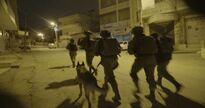
The Israeli occupation forces (IOF) at dawn Wednesday kidnaped at least six Palestinian citizens during campaigns in different West Bank areas.
A reporter for the Palestinian Information Center (PIC) said that clashes took place in Jenin refugee camp after Israeli soldiers stormed some homes.
He added that the IOF kidnaped Izzuddin al-Hardan, who was released from an Israeli jail three months ago, as well as another young man called Mahmoud al-Dab’ie.
In al-Khalil, local sources reported that soldiers stormed the southern area of the city and kidnaped a young man they identified as Mohamed Abu Hayya after ransacking his home.
The IOF also stormed Idnna town, west of al-Khalil, and searched the house of prisoner Ziyad Awwad.
Awwad was one of the prisoners who were exchanged for an Israeli soldier October 2011 following a mediated swap deal between the Hamas Movement and the Israeli government.
In 2014, he was arrested and rejailed after he carried out a shooting operation that led to the killing of a Jewish settler in the occupied West Bank.
Three other citizens were also reportedly kidnaped from their homes at dawn in different West Bank areas.
A reporter for the Palestinian Information Center (PIC) said that clashes took place in Jenin refugee camp after Israeli soldiers stormed some homes.
He added that the IOF kidnaped Izzuddin al-Hardan, who was released from an Israeli jail three months ago, as well as another young man called Mahmoud al-Dab’ie.
In al-Khalil, local sources reported that soldiers stormed the southern area of the city and kidnaped a young man they identified as Mohamed Abu Hayya after ransacking his home.
The IOF also stormed Idnna town, west of al-Khalil, and searched the house of prisoner Ziyad Awwad.
Awwad was one of the prisoners who were exchanged for an Israeli soldier October 2011 following a mediated swap deal between the Hamas Movement and the Israeli government.
In 2014, he was arrested and rejailed after he carried out a shooting operation that led to the killing of a Jewish settler in the occupied West Bank.
Three other citizens were also reportedly kidnaped from their homes at dawn in different West Bank areas.
4 june 2019
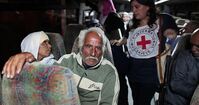
Israel’s high court of justice has approved a previous decision made by the public security minister banning prison visits for Hamas prisoners who are from Gaza.
According to the Hebrew website 0404, the high court rejected a petition filed by prisoner Fadi Namnam against the decision that prohibited Hamas prisoners from receiving visits.
The decision was issued about one year ago by Gilad Erdan, minister of public security.
The court defended the minister’s decision as “right” and said there were security reasons justifying it.
Erdan already said he had taken such measure to pressure Hamas to release detained soldiers in Gaza.
He also threatened to continue imposing restrictions on Palestinian prisoners in Israeli jails to force Hamas to release the soldiers.
According to the Hebrew website 0404, the high court rejected a petition filed by prisoner Fadi Namnam against the decision that prohibited Hamas prisoners from receiving visits.
The decision was issued about one year ago by Gilad Erdan, minister of public security.
The court defended the minister’s decision as “right” and said there were security reasons justifying it.
Erdan already said he had taken such measure to pressure Hamas to release detained soldiers in Gaza.
He also threatened to continue imposing restrictions on Palestinian prisoners in Israeli jails to force Hamas to release the soldiers.
3 apr 2019
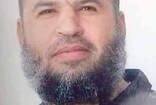
Palestinian prisoners Emad Mousa suffered severe and serious injuries when he was physically assaulted by Israeli forces during recent events in the Negev jail, his family affirmed.
The family told a reporter for the Palestinian Information Center (PIC) that Mousa was transferred to Soroka Hospital in Beersheba after Israeli forces attacked him and his fellow inmates in the Negev jail recently.
According to a medical report from the hospital, the family added, Mousa lost three units of blood after he was left bleeding until the following day of the events.
The prisoners also suffer from a serious rib fracture and multiple injuries and bruises in the head, chest, left leg and other parts of his body
Prisoner Emad Mousa is one of the detainees who have been rejailed by Israel after their release as part of the 2011 swap deal.
The family told a reporter for the Palestinian Information Center (PIC) that Mousa was transferred to Soroka Hospital in Beersheba after Israeli forces attacked him and his fellow inmates in the Negev jail recently.
According to a medical report from the hospital, the family added, Mousa lost three units of blood after he was left bleeding until the following day of the events.
The prisoners also suffer from a serious rib fracture and multiple injuries and bruises in the head, chest, left leg and other parts of his body
Prisoner Emad Mousa is one of the detainees who have been rejailed by Israel after their release as part of the 2011 swap deal.
6 mar 2019
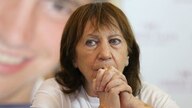
Zehava Shaul, mother of Oron Shaul, who's remains are held by Hamas after the IDF declared him dead in 2014, begs for answers as her health deteriorates; 'I want to know about every step Oron took,' she says. 'If he's dead — I want a grave.'
Zehava Shaul, mother of a fallen IDF soldier whose remains are believed to be held by Hamas in the Gaza Strip, is fighting cancer and feels like she hasn't got much time left. "I just want to see my son Oron," she said Monday, weeping; "alive, wounded — and if he's dead, I want a grave."
Zehava, 63, has been fighting cancer for years and endured two brain surgeries. Two weeks ago she passed out and her situation is deteriorating. According to the IDF, her son Oron, a soldier in the 13th Battalion of the Golani Brigade, died alongside five other IDF soldiers, in July 20, 2014, during Operation Protective Edge.
Oron was traveling through the Shuja'iyya neighborhood in Gaza City in an armored personnel carrier that was hit by an anti-tank missile, killing the six soldiers in it. Hamas quickly declared it had seized Oron — not mentioning if he is alive or dead.
Following the incident, the IDF declared Oron as a deceased soldier whose burial place is unknown.
The Shaul family has been struggling relentlessly ever since, in an attempt to discover the whereabouts of their son or return his remains. Oron's father, Herzl Shaul, passed away two and a-half years ago without receiving any word about his son, after he suffered from cancer.
"Oron my love, I have a confession to make," Herzl wrote in a letter to his son a few days before he died. "Remember when you said you were going to Golani, and mom was begging you to give it up because it's dangerous? Well, you need to know that in my heart I was happy and proud. I want to apologies for not listening to your mother."
Today, Zehava is the one who's slipping away. "I'm not doing so good, I don’t have much time," she said, and lamented the stand-still regarding her son.
Zehava poins a finger towards Prime Minister Benjamin Netanyahu, Blue and White leaders Benny Gantz and Moshe "Bogie" Ya'alon, former head of the personnel directorate at the IDF Orna Barbibai and Rafi Peretz, former IDF chief Rabbi. All held chief roles in Operation Protective Edge, and are currently running for office in the April elections.
"For four-and –a-half years all these contenders did nothing to get my son back. They didn't lift a finger," Zehava said. "It happened under their watch. Benny Gantz is a charming man with a heart of gold, but in regards to actions? Nothing. He isn't fit to run this country. None of them is willing to guarantee he will take care of Oron's case."
Zehava believes nothing is being done, and said she is ready to give up. "The prime minister only knows how to make promises; he doesn't know how to keep them. I wan't to know about every step Oron took. We've petitioned to the High Court of Justice and it was established that there is still no certainty regarding Oron's fate, and that the decision to declare him as deceased is not a substitute for seeking complete certainty."
"I just want to know where my son is already," Zehava concluded. "And if he's dead, I at least want to have a grave."
Zehava Shaul, mother of a fallen IDF soldier whose remains are believed to be held by Hamas in the Gaza Strip, is fighting cancer and feels like she hasn't got much time left. "I just want to see my son Oron," she said Monday, weeping; "alive, wounded — and if he's dead, I want a grave."
Zehava, 63, has been fighting cancer for years and endured two brain surgeries. Two weeks ago she passed out and her situation is deteriorating. According to the IDF, her son Oron, a soldier in the 13th Battalion of the Golani Brigade, died alongside five other IDF soldiers, in July 20, 2014, during Operation Protective Edge.
Oron was traveling through the Shuja'iyya neighborhood in Gaza City in an armored personnel carrier that was hit by an anti-tank missile, killing the six soldiers in it. Hamas quickly declared it had seized Oron — not mentioning if he is alive or dead.
Following the incident, the IDF declared Oron as a deceased soldier whose burial place is unknown.
The Shaul family has been struggling relentlessly ever since, in an attempt to discover the whereabouts of their son or return his remains. Oron's father, Herzl Shaul, passed away two and a-half years ago without receiving any word about his son, after he suffered from cancer.
"Oron my love, I have a confession to make," Herzl wrote in a letter to his son a few days before he died. "Remember when you said you were going to Golani, and mom was begging you to give it up because it's dangerous? Well, you need to know that in my heart I was happy and proud. I want to apologies for not listening to your mother."
Today, Zehava is the one who's slipping away. "I'm not doing so good, I don’t have much time," she said, and lamented the stand-still regarding her son.
Zehava poins a finger towards Prime Minister Benjamin Netanyahu, Blue and White leaders Benny Gantz and Moshe "Bogie" Ya'alon, former head of the personnel directorate at the IDF Orna Barbibai and Rafi Peretz, former IDF chief Rabbi. All held chief roles in Operation Protective Edge, and are currently running for office in the April elections.
"For four-and –a-half years all these contenders did nothing to get my son back. They didn't lift a finger," Zehava said. "It happened under their watch. Benny Gantz is a charming man with a heart of gold, but in regards to actions? Nothing. He isn't fit to run this country. None of them is willing to guarantee he will take care of Oron's case."
Zehava believes nothing is being done, and said she is ready to give up. "The prime minister only knows how to make promises; he doesn't know how to keep them. I wan't to know about every step Oron took. We've petitioned to the High Court of Justice and it was established that there is still no certainty regarding Oron's fate, and that the decision to declare him as deceased is not a substitute for seeking complete certainty."
"I just want to know where my son is already," Zehava concluded. "And if he's dead, I at least want to have a grave."
20 jan 2019
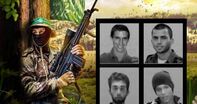
The Islamic Resistance Movement, Hamas, on Saturday denied reports about any new progress in the talks on a second prisoner swap deal with Israel.
Hamas's spokesman Fawzi Barhoum said on Twitter, "There is nothing new in the prisoners file, and Israel is not ready to conclude a new prisoner exchange deal."
Barhoum affirmed that the freedom of Palestinian prisoners held in Israeli jails is a top priority to his movement, stressing that Hamas will remain loyal to their sacrifices.
Al-Qassam Brigades, Hamas's armed wing, in early April 2016 announced that they were holding four Israeli soldiers, including two soldiers captured during the 2014 assault on Gaza.
Al-Qassam Brigades at the time said that Israel would not get any information about them without "paying a price".
Hamas demands the release of the Palestinian prisoners freed in the Wafa al-Ahrar deal in 2011 and re-arrested later before it starts negotiations on a second prisoner swap deal.
An Egypt-Germany mediated prisoner swap deal was concluded between Hamas and Israel in October 2011, based on which Israel released 1027 Palestinian prisoners in exchange for the Israeli soldier Gilad Shalit who was captured in Gaza in 2006.
Hamas's spokesman Fawzi Barhoum said on Twitter, "There is nothing new in the prisoners file, and Israel is not ready to conclude a new prisoner exchange deal."
Barhoum affirmed that the freedom of Palestinian prisoners held in Israeli jails is a top priority to his movement, stressing that Hamas will remain loyal to their sacrifices.
Al-Qassam Brigades, Hamas's armed wing, in early April 2016 announced that they were holding four Israeli soldiers, including two soldiers captured during the 2014 assault on Gaza.
Al-Qassam Brigades at the time said that Israel would not get any information about them without "paying a price".
Hamas demands the release of the Palestinian prisoners freed in the Wafa al-Ahrar deal in 2011 and re-arrested later before it starts negotiations on a second prisoner swap deal.
An Egypt-Germany mediated prisoner swap deal was concluded between Hamas and Israel in October 2011, based on which Israel released 1027 Palestinian prisoners in exchange for the Israeli soldier Gilad Shalit who was captured in Gaza in 2006.
Page: 2 - 1
SWAP - A - B - C - D - E - F - G - H - I - J - K - L - M - N - O - P - Q - R - S - T - U - V - W - X - Y - Z
